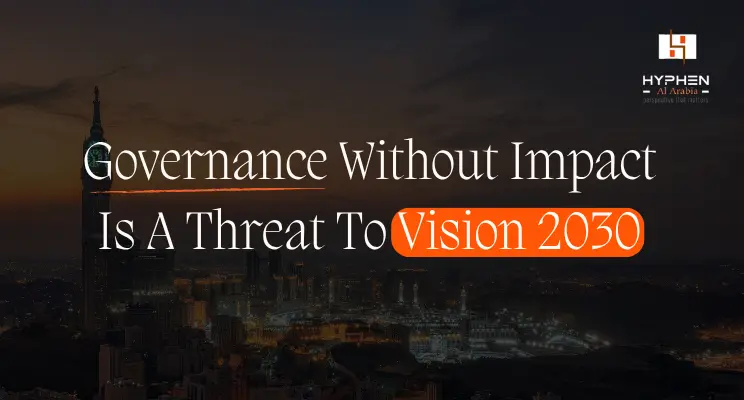Governance in Saudi Arabia is evolving fast, yet many organizations still struggle to see real outcomes from their frameworks and policies. Vision 2030 has driven companies to modernize governance practices, but too often the impact remains limited.
When I speak with CEOs, CFOs and Board Members in Saudi Arabia, I hear a common question:
“We have frameworks. We have committees. We have policies. But are we actually seeing the impact?”
In too many cases the honest answer is no.
Governance in the Kingdom has seen considerable progress over the last decade. Under Vision 2030, businesses are raising standards, attracting investment and operating at a more global level.
Yet, even with compliant structures, impact is missing.
I call this the Governance Gap: the distance between what is documented and what actually improves business performance.
Where Governance in Saudi Arabia Is Falling Short
From my work with high-growth companies here, I see three recurring gaps that hinder governance impact:
1. Lack of clarity on the end objective
Many organisations focus on compliance for its own sake, when governance should be about creating sustainable value, not just satisfying regulators.
Governance becomes a tick-box exercise rather than a strategic enabler.
2. Ownership is not embedded at the top
Values and culture cannot be outsourced or delegated without personal commitment from senior leadership. Ownership must be visible, from the Board, the CEO and senior executives downward.
3. Integration remains a distant dream
Governance touches every facet of the business from purpose to values, structure to processes, strategy to performance management.
I once worked with a firm which invested heavily in crafting company values and communicating them to 5,000+ staff but departments still operated as silos.
Another enterprise had 20+ risks and 70+ mitigations on paper but none were linked to strategic objectives or business outcomes.
In both instances, governance had become a cost centre, not a value creator. And that’s especially dangerous when the market is transforming as fast as Saudi Arabia’s.
Why “Impact Driven Governance” Matters in Saudi Arabia
Because Vision 2030 isn’t about compliance. It’s about performance, trust and sustainability.
Impact Driven Governance flips the focus:
- From satisfying regulators → To strengthening the business
- From avoiding risk → To making better decisions
- From control for control’s sake → To clarity that accelerates growth
Three Things That Need to Change Immediately
To turn governance from burden into advantage, organisations must act now:
1️⃣ Align governance with strategy
Every control, every committee, every policy should protect performance not just paperwork.
2️⃣ Make ownership non-negotiable
When people understand the “why” behind governance, adoption follows naturally.
3️⃣ Build insight not just reports
Boards must see issues before they hit the bottom line. Real governance means proactive insights, not reactive checklists.
Where I’ve Seen Impact Happen
In a recent assignment with a Saudi power company, we shifted the focus from risk registers and heat-maps to linking operational risks with plant-availability targets.
We flagged the potential unavailability of spare parts as a major risk, escalated the matter to senior management and secured investment in alternative sourcing.
Months later, a plant fault occurred because the spare parts were available, a potentially major loss was avoided.
This isn’t theory, it’s real governance, in real time.
The Future of Governance in Saudi Arabia
Saudi Arabia is fast becoming one of the most attractive investment destinations globally. But growth without proper governance creates fragility, not strength.
To scale with confidence, attract global capital, sustain success post-IPO and build trust inside and outside the boardroom, governance must not simply exist, it must perform.
My Commitment
I work with companies to link purpose and process, objectives and risk, culture and structure, so that governance becomes visible, measurable and valuable.
For further insights, see my LinkedIn article titled “Governance Without Impact Is A Threat To Vision 2030”, published under my profile.
Other resources: Read more about GRC Trends in 2025

